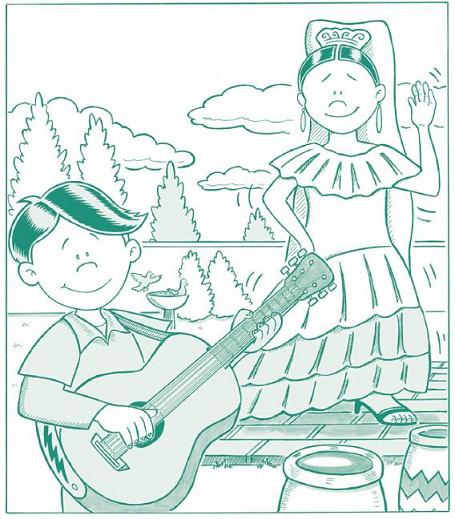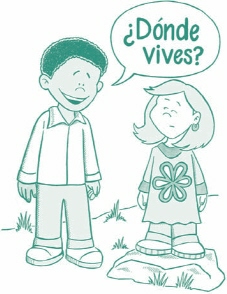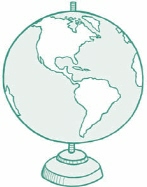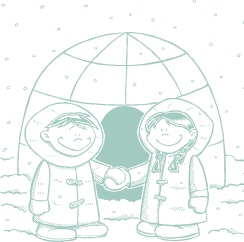
CHAPTER 9
Who are you?
¿Quién eres?


¿Cómo?—
Say What?
Where Do You Live?—¿Dónde vives?
When you travel or meet people, one of the first things you will probably talk about is where you live.
To ask where someone lives, say ¿Dónde vives?
The answer begins with Vivo en (I live in), followed by a city, state, province, or country.
| English | Spanish |
| Where do you live? | ¿Dónde vives? |
| I live in Detroit. | Vivo en Detroit. |
| I live in California. | Vivo en California. |
| I live in Canada. | Vivo en Canadá. |
| I live near Los Angeles. | Vivo cerca de Los Angeles. |
| I live near Chicago. | Vivo cerca de Chicago. |
To ask where someone is from (which might not be the same as where he or she lives now), ask ¿De dónde eres? And then you can answer Soy de (I’m from) or Nací en (I was born in).
| English | Spanish |
| Where are you from? | ¿De dónde eres? |
| I'm from Houston. | Soy de Houston. |
| I'm from Ontario. | Soy de Ontario. |
| I was born in Portland. | Nací en Portland. |
| I was born in New York. | Nací en Nueva York. |
You might also want to say that you used to live somewhere:
| English | Spanish |
| I used to live in San Francisco. | Antes viví en San Francisco. |
| I used to live in Florida. | Antes viví en Florida. |
And finally, if you want to keep in touch with someone, you’ll need to give them your address or phone number.
| English | Spanish |
| My address is | Mi dirección es |
| My email address is | Mi dirección electrónica es |
| My phone number is | Mi número de teléfono es |
Countries—Países
Knowing the Spanish words for different countries will be useful in many ways: for talking about where you are from and where you are traveling to, as well as understanding where the people you meet are from.
Many places have the same name in Spanish and English:
• Argentina
• Asia
• Australia
• Chile
• China
• Colombia
• Costa Rica
• Ecuador
• India
• Puerto Rico
• Portugal

Here are a couple of sample sentences to guide you:
| English | Spanish |
| I want to go to Australia. | Quiero ir a Australia. |
| I went to Costa Rica last year. | Fui a Costa Rica el año pasado. |
Consejo
IMPORTANT TIP
Consejo
IMPORTANT TIP

But for others, the words are different in Spanish and English.
| English | Spanish |
| Africa | África |
| Brazil | Brasil |
| Canada | Canadá |
| Egypt | Egipto |
| England | Inglaterra |
| Europe | Europa |
| France | Francia |
| Germany | Alemania |
| Italy | Italia |
| Japan | Japón |
| Mexico | México |
| Poland | Polonia |
| Russia | Rusia |
| Spain | España |
| Switzerland | Suiza |
| United States | Estados Unidos |
Nationality—Nacionalidad
Another way to talk about where you’re from is to talk about your nationality. For example, if you are from America, you are American. Here are some other nationalities in the world:
| English | Spanish |
| African | africano |
| American (United States) | estadounidense |
| American (North or South) | americano |
| Argentine | argentino |
| Asian | asiático |
| Australian | australiano |
| Brazilian | brasileño |
| Canadian | canadiense |
| Chilean | chileno |
| Chinese | chino |
| Colombian | colombiano |
| Costa Rican | costarricense |
| Ecuadoran | ecuatoriano |
| Egyptian | egipcio |
| English | inglés |
| European | europeo |
| French | francés |
| German | alemán |
| Indian | indio |
| Italian | italiano |
| Japanese | japonés |
| Mexican | mexicano |
| Polish | polaco |
| Portuguese | portugués |
| Puerto Rican | puertorriqueño |
| Russian | ruso |
| Spanish | español |
| Swiss | suizo |
| English | Spanish |
| I am American. | Soy estadounidense. |
| My mom is a Spaniard. | Mi madre es española. |
Languages—Idiomas
There are hundreds of languages in the world. Here are the Spanish names for the ones you might need to talk about.
| English | Spanish |
| Arabic | el árabe |
| Catalan | el catalán |
| Chinese | el chino |
| Dutch | el neerlandés |
| English | el inglés |
| French | el francés |
| German | el alemán |
| Italian | el italiano |
| Japonese | el japonés |
| Korean | el coreano |
| Persian | el persa |
| Polish | el polaco |
| Portuguese | el portugués |
| Russian | el ruso |
| Spanish | el español |
| Vietnamese | el vietnamita |
¡CUIDADO!
Mistake to Avoid
In Spanish, all languages are masculine and are not capitalized. The same is true for nationalities. For example: the Spanish language would be el idioma español, and He is a Spaniard would be Él es español.
¿Cómo?—
Say What?

| English | Spanish |
| I speak English and Spanish. | Hablo inglés y español. |
| I don't speak German. | No hablo alemán. |
Do you know anyone who speaks a second language? Perhaps one of your parents learned another language in college, or you have a friend from a different country. For some more writing practice, write down some sentences explaining who of your friends and family speaks another language. Remember that the words for different languages are lowercased when written in Spanish. Here are a couple of examples:
| English | Spanish |
| My mother speaks Italian. | Mi madre habla italiano. |
| My friend speaks French. | Mi amigo habla francés. |
Now try writing your own sentences in the spaces below:
_________________________________________________________________
_________________________________________________________________
_________________________________________________________________